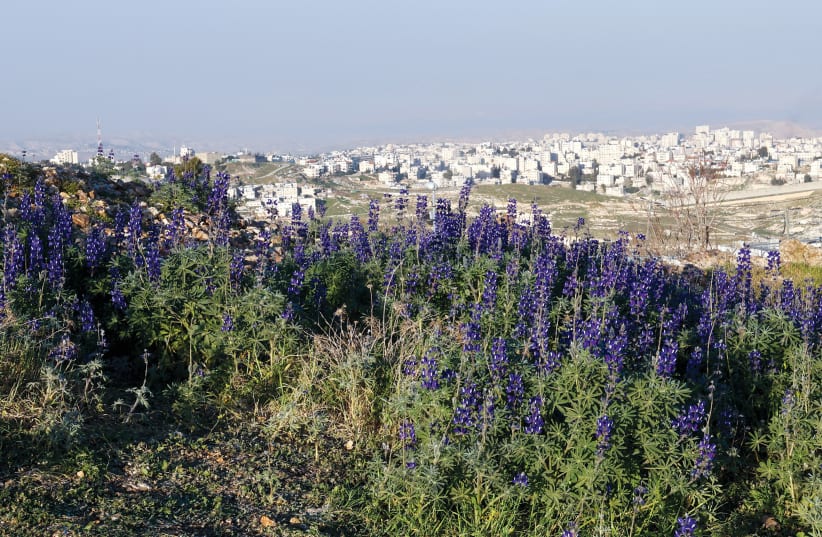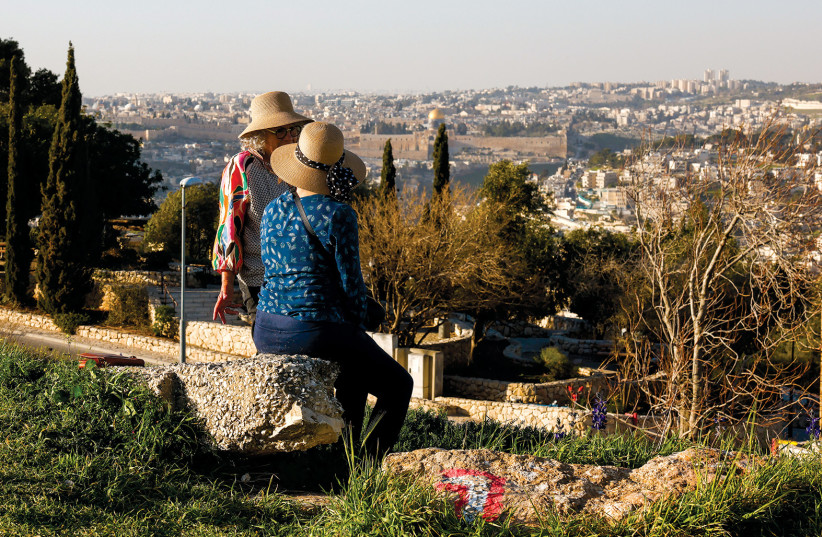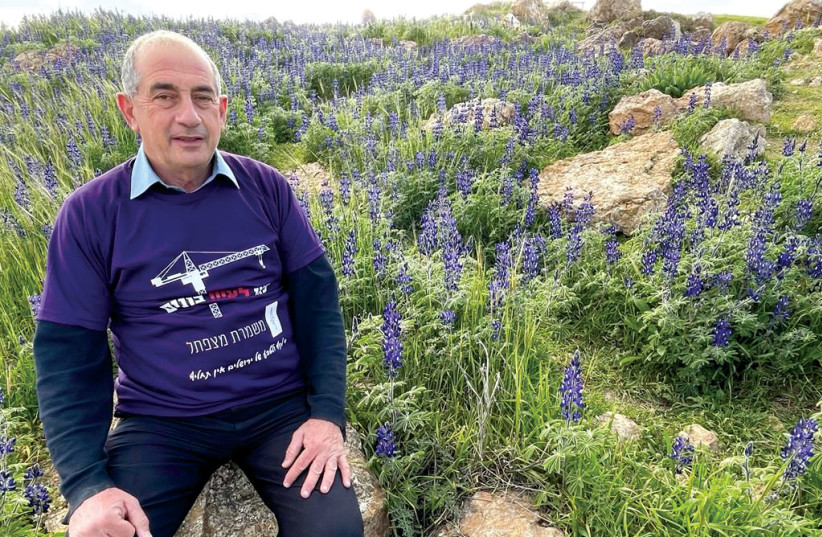The powers that be appear to be at it again. The David and Goliath scenario, which plagues life for many of us unelected, far lower-income bracket, ordinary tax-paying mortals on the street, has reared its threatening head again over at Armon Hanatziv.
In truth, the disconcerting fact of the matter is that if you are troubled by some development in your neck of the woods, by a decision by, say, the local authority to do away with a local green lung and replace it with a 30-story residential tower block – not a rarity in Jerusalem in recent times – you would have to free up significant chunks of time and financial resources to try to stop it.
If you happen to find your way over to the end of Meir Nakar Street these days, in the aforementioned eastern urban neighborhood, you would be met by a delightful eyeful. The promontory there, which locals affectionately call Mitzpeh-Tel, is currently awash with purple lupines.
It is quite a sight to see at this time of the year, which draws visitors from all quarters of the city and other parts of the country. But, if the authorities have their way, that and the unparalleled vista that greets you as you get to the top of the hillock will soon be consigned to the history books.
Mitzpeh-Tel – the name references Haya Shenhav’s enduringly popular 1970 Mitz Petel (Raspberry Juice) children’s book and translates as “mound observation point” – is one of the increasingly rare untouched beauty spots in this sprawling capital city. That is about to change, radically and irrevocably when a new Israel Police compound is built on much of the hill.
The construction project is due to be completed by 2025, providing our law enforcers with a new home to replace the current facility, which sits nearby below Mitzpeh-Tel. The relocation plan is the result of a decision by the Rami Levy supermarket company to reclaim the land it owns, which it rented out to the police for several years, and add another outlet to its ever-growing chain.
The building plan went through the requisite phases of review by official bodies. Recently, the Regional Planning and Construction Committee approved the initiative, paving the way for the construction of a sizable police station five stories high with all sorts of utilities and complementary appendages.
Longtime resident Dr. Shulamit Laderman says the committee’s decision is nothing short of a catastrophe for the local environment and quality of life. She says it is not just about the eyesore and covering the soil and severely encroaching on the annual wildflower spread.
“It is not just about the actual police station,” she notes. “There is the noise of the vehicles entering and exiting the station, and there will be powerful light projectors at night that will shine right into my apartment.”
“It is not just about the actual police station. There is the noise of the vehicles entering and exiting the station, and there will be powerful light projectors at night that will shine right into my apartment.”
Shulamit Laderman
Laderman has a stronger attachment with Armon Hanatziv than most. She is one of the original residents, moving there with her American-born husband and children in 1974. Now, almost half a century on, she feels the very fabric of life in the neighborhood is going to be shattered by the plan to build a monstrosity.
“This means we will have to live in the shadow of large police headquarters, with the danger of radiation from police antennae. And there will be the noise of sirens and the PA system, and increased traffic on the narrow, quiet neighborhood street where we have been living for over 45 years.”
HOWEVER, IT seems there is still some hope of salvation.
“We have 45 days to appeal against the committee’s decision,” Laderman explains. That, as noted, demands some loin girding and investment of time and hard cash. “We are starting a crowdfunding venture. We need to raise NIS 100,000 to pay for the lawyer, court hearings and all the other logistics. That’s a lot of money.” That it is, particularly for the residents of a sleepy part of town that is not too high up in the socioeconomic stakes.
Laderman says the situation, in Armon Hanatziv and elsewhere around Jerusalem, has deteriorated since Moshe Lion was elected mayor. “He is only interested in arnona [municipal rates] and the building contractors.”
Interestingly, Lion is up for reelection later this year, so if Laderman, her neighbors and the local community administration manage to make enough noise, perhaps the mayor will reconsider his backing of the police construction plan.
Yossi Havilio, one of several deputy mayors and a member of Lion’s coalition, certainly hopes so. “Unfortunately, the decision by the Regional Planning and Construction Committee is being supported by the Jerusalem Municipality and, of course, the Israel Police. I am against it.”
“Unfortunately, the decision by the Regional Planning and Construction Committee is being supported by the Jerusalem Municipality and, of course, the Israel Police. I am against it.”
Yossi Havillo
As a candidate for the mayorship, one wouldn’t expect Havilio to say anything else. But Gadi Dahan, who lives a stone’s throw from Mitzpeh-Tel, says the stance is not mere electioneering. “I like Yossi. He has been a supporter of ecological issues in general for a long time.” Havilio will, no doubt, be heartened by that vote of confidence by one of the local electorate.
The deputy mayor says he is stunned by developments in the city and says decisions like the Oz Police Station construction project are counterproductive. “I think that anywhere else in the world, they would make every effort to protect a place like Lupines Hill [an alternative moniker for Mitzpeh-Tel]. It is a top-class nature and tourism site.
“It also offers a wonderful panoramic view. You have the Temple Mount on one side, the Dead Sea and Herodion.” That’s the important archaeological site to the southeast of Bethlehem, where King Herod built a palatial residence in the late first century BCE.
“Having a police station there will decimate the spot,” Havilio continues. “A nature and community space cannot live side by side with such a massive police station, with antennae, a prison and a Border Police facility. And there will be alarms going off.” All of which spells trouble for the locals and will have an adverse effect on the quality of life.
Naturally, Havilio has nothing against having an effective, smoothly running police service in this country. He simply feels that Mitzpeh-Tel is not the place for a police compound of such proportions. There were, he points out, other solutions to be had.
“I believe this is a terrible mistake that will have a detrimental effect on life here for generations to come,” he says. “We suggested a number of alternatives that were not addressed seriously enough.”
A file Havilio sent me notes several additional sites which, he feels, could provide for all the Israel Police’s needs without damaging some of Mother Nature’s blessings. A couple are very close to the station’s current site, a third is in Nof Zion, just east of the Green Line in the Palestinian neighborhood of Jabel Mukaber.
“We think it is important to have a police station in the area, and Armon Hanatziv deserves to be safe and secure,” says Havilio. “But security should not be at the expense of nature.”
The deputy mayor says he is cautiously optimistic about the chances of keeping the bulldozers off the hill, particularly in the wake of a successful appeal earlier this month against plans to build two road tunnels near Ora Junction which, the objectors argued, would have spelled disasters for the local ecosystems.
“I hope we can repeat that here. We intend to turn to the courts, and I hope it is successful.”
I asked the mayoral candidate whether he felt there is a pattern here to the current municipality’s stance on the nature versus real estate balancing act. “Absolutely!” he exclaims. “In 2009, the Jerusalem Municipality conducted a survey of urban nature sites. At the time, there were around 170 sites. As of now, two-thirds have either been destroyed or are at risk. Two-thirds! The municipality does not attach enough importance to safeguarding urban nature sites.”
THAT IS strident stuff from a seasoned politician.
But what do the rest of us think?
Is the average Jerusalemite bothered about places like Mitzpeh-Tel? Do they care about wildflowers and spectacular views? Or are they just trying their best to keep the wolves at bay and their kids clothed and fed, particularly in the emotional and economic aftermath of the coronavirus era?
“I think there are more people today in Jerusalem who are interested in green spaces,” Havilio suggests. “Frankly, I don’t think there are enough. I hope that changes. After corona and the greater interest in the climate crisis, that has to be important for all of us.”
Dahan, who earns a crust as a tour guide, is very interested in that. It would not be going too far to say he is up in arms over last week’s Regional Planning and Construction Committee’s ruling. He says Lion has no interest in nature’s glories or the flora in Armon Hanatziv which, he notes, include some rare beauties.
“The lupines are the casus belli [PR teaser]. There is a lot more than lupines on the hill. There are over 200 other species, and there are some that don’t grow anywhere else in the Jerusalem area and haven’t been seen anywhere else for over 20 years.” He cites the delicate crocus pallasii for one. “But, let’s face it, who is going to come out and fight for the crocus pallasii?” he observes with a degree of despair.
Still, Dahan says he, Laderman and the other local residents are not going to give up without a struggle. The tour guide warns that the municipality has grander plans for the site. “They have been using part of the area of the hills as a garbage dump and allowing trucks to stop there and make a mess. The municipality has been actively encouraging that!”
He claims that Lion is using a softly softly approach to the issue. “Don’t be fooled by their talk about how the police station will only occupy part of the hill. That’s rubbish. They have designs on the whole area. It is all real estate for them.”
There are other parties in Jerusalem looking to raise awareness about the construction project and the need to preserve the city’s natural treasures. The Bicycles for Jerusalem (BFJ) organization has arranged a group ride from the First Station to Armon Hanatziv and other spots on March 24 (departure 9 a.m.). “We are happy to ride there and get other people along to learn about this important topic,” says BFJ member Avi Frank.
Frank, who lives in Rehavia, has an upbeat take on the state of ecological matters in Jerusalem as a whole, at least on the civilian level. “I am happy there are so many nature spots around town. There is a strong bond here between people and nature.” Hopefully, some of that will filter through to Mr. Lion, and the Armon Hanatziv residents’ appeal will succeed.
For his part, Dahan says this is a do-or-die scenario and time to stop the rot. “The mayor blows his own trumpet about projects like the Gazelle Valley. Someone should remind him that if it were left up to the municipality, there would now be 1,400 housing units and nothing else there.”
This, Dahan feels, is a much bigger issue and a campaign that demands a no-holds-barred ethos. “Armon Hanatziv is nobody’s private backyard. It is our front balcony. Our fight is being funded out of the residents’ own pockets. We are scrimping and saving because there is a whole neighborhood behind us, people who live here and love this place, and the city.” ❖
To learn more: www.facebook.com/SaveMitzpetel, and www.mitzpetel.com



